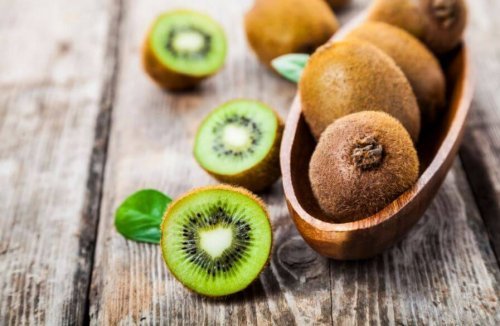Contribution of Kiwi to our Diet

Many nutritionists avoid considering certain foods as miraculous, however, there are exceptions. One of these is the kiwi, a fruit that comes very close to the idea of a prodigious and extraordinary ingredient.
This green fruit with a thin skin, that’s covered in small, brown fuzz, has many benefits. It’s not by chance that this fruit was in demanded for its medicinal properties, in ancient China. This despite the widespread belief, that its origins were in New Zealand.
The kiwi: king of vitamin C
Traditionally, we may think that the orange is the citrus fruit that contains the largest amount of vitamin C. Actually, the fruit that contributes the most vitamin C, is the kiwi.

A cup of Yang Tao, a name by which kiwi is known in China, contains up to 273 percent more than the minimum daily requirement of this essential nutrient. This is five times more than the same portion of an orange offers.
Due to its composition, the kiwi is a powerful antioxidant that eliminates the free radicals present in our body. These elements are responsible for premature aging. It also serves to fortify the immune system and reduces the incidence of viruses, bacteria, and infections.
Vitamin C regulates blood pressure and decreases the presence of bad cholesterol. In general, the kiwi is an essential ally in avoiding heart problems. Additionally, it reduces the risk of cataracts.
Another contribution of kiwi: an ally of the nervous system
We recommend that people who are subjected to high levels of daily stress, should eat more of this fruit. Its efficiency for reducing levels of stress and anxiety is more than proven. Likewise, eating a couple of slices of kiwi just before a job interview can help people to stay calm.
No incidences on the scale
An average size sample (about 6.2 centimeters long) provides just 54 calories, plus 0.4 grams of fat, and the same amount of sugar as a large pineapple. All this is complemented with abundant fiber, so this fruit is also recommended for controlling body weight.

Rich in omega 3
This is an essential fatty acid, which our body is unable to produce on its own. Its presence is fundamental for the proper function of cell membranes, especially in the brain and retina.
Omega 3 contributes to the reduction of bad cholesterol, in addition to offering broad anti-inflammatory and autoimmune properties. Due to this, the kiwi aids in the treatment of diseases such as, cancer, arthritis, and lupus. Likewise, it lowers the risk of suffering from atherosclerosis or thrombosis, among other blood diseases.
Prevents constipation
Its high rate of soluble fiber also facilitates digestion and intestinal transit. It reduces symptoms of irritable bowel syndrome, diarrhea, or abdominal pain. To encourage bowel movements, we recommend including it regularly at breakfast, combined with natural yogurt or cereal.
Protects the skin
Eating kiwi is especially recommended during the sunny days of summer time. Another of its ingredients—lutein (a chemical compound also known as, carotenoid)— has the ability to filter UV rays.

Regarding its use for cosmetic purposes, it’s useful to combat acne, scars derived from improper wound healing or age spots. It’s also great to use in hair treatments, since it has the ability to deeply hydrate any type of hair without damaging it.
Ideal for pregnant or lactating women
Kiwis are also an important source of folic acid. This water-soluble vitamin is necessary for the maturation of hemoglobin, so it’s particularly necessary when fighting or avoiding anemia.
The well-known vitamin B9 plays a fundamental role in pregnant and breastfeeding women. Among other benefits, it prevents deformations in the placenta and anencephaly. Moreover, it helps to prevent spine damage in babies.
Many nutritionists avoid considering certain foods as miraculous, however, there are exceptions. One of these is the kiwi, a fruit that comes very close to the idea of a prodigious and extraordinary ingredient.
This green fruit with a thin skin, that’s covered in small, brown fuzz, has many benefits. It’s not by chance that this fruit was in demanded for its medicinal properties, in ancient China. This despite the widespread belief, that its origins were in New Zealand.
The kiwi: king of vitamin C
Traditionally, we may think that the orange is the citrus fruit that contains the largest amount of vitamin C. Actually, the fruit that contributes the most vitamin C, is the kiwi.

A cup of Yang Tao, a name by which kiwi is known in China, contains up to 273 percent more than the minimum daily requirement of this essential nutrient. This is five times more than the same portion of an orange offers.
Due to its composition, the kiwi is a powerful antioxidant that eliminates the free radicals present in our body. These elements are responsible for premature aging. It also serves to fortify the immune system and reduces the incidence of viruses, bacteria, and infections.
Vitamin C regulates blood pressure and decreases the presence of bad cholesterol. In general, the kiwi is an essential ally in avoiding heart problems. Additionally, it reduces the risk of cataracts.
Another contribution of kiwi: an ally of the nervous system
We recommend that people who are subjected to high levels of daily stress, should eat more of this fruit. Its efficiency for reducing levels of stress and anxiety is more than proven. Likewise, eating a couple of slices of kiwi just before a job interview can help people to stay calm.
No incidences on the scale
An average size sample (about 6.2 centimeters long) provides just 54 calories, plus 0.4 grams of fat, and the same amount of sugar as a large pineapple. All this is complemented with abundant fiber, so this fruit is also recommended for controlling body weight.

Rich in omega 3
This is an essential fatty acid, which our body is unable to produce on its own. Its presence is fundamental for the proper function of cell membranes, especially in the brain and retina.
Omega 3 contributes to the reduction of bad cholesterol, in addition to offering broad anti-inflammatory and autoimmune properties. Due to this, the kiwi aids in the treatment of diseases such as, cancer, arthritis, and lupus. Likewise, it lowers the risk of suffering from atherosclerosis or thrombosis, among other blood diseases.
Prevents constipation
Its high rate of soluble fiber also facilitates digestion and intestinal transit. It reduces symptoms of irritable bowel syndrome, diarrhea, or abdominal pain. To encourage bowel movements, we recommend including it regularly at breakfast, combined with natural yogurt or cereal.
Protects the skin
Eating kiwi is especially recommended during the sunny days of summer time. Another of its ingredients—lutein (a chemical compound also known as, carotenoid)— has the ability to filter UV rays.

Regarding its use for cosmetic purposes, it’s useful to combat acne, scars derived from improper wound healing or age spots. It’s also great to use in hair treatments, since it has the ability to deeply hydrate any type of hair without damaging it.
Ideal for pregnant or lactating women
Kiwis are also an important source of folic acid. This water-soluble vitamin is necessary for the maturation of hemoglobin, so it’s particularly necessary when fighting or avoiding anemia.
The well-known vitamin B9 plays a fundamental role in pregnant and breastfeeding women. Among other benefits, it prevents deformations in the placenta and anencephaly. Moreover, it helps to prevent spine damage in babies.
This text is provided for informational purposes only and does not replace consultation with a professional. If in doubt, consult your specialist.








